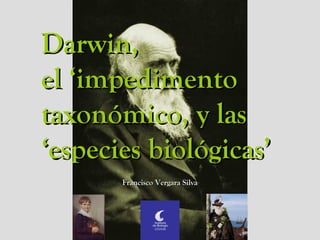Darwin, el вҖҳimpedimento taxonГіmico, y las вҖҳespecies biolГіgicasвҖҷ
- 1. Darwin,Darwin, el вҖҳimpedimentoel вҖҳimpedimento taxonГіmico, y lastaxonГіmico, y las вҖҳespecies biolГіgicasвҖҷвҖҳespecies biolГіgicasвҖҷ Francisco Vergara SilvaFrancisco Vergara Silva
- 2. Sir Joseph Dalton Hooker, FRSSir Joseph Dalton Hooker, FRS (30 junio 1817 вҖ“ 10 diciembre 1911)(30 junio 1817 вҖ“ 10 diciembre 1911) http://en.wikipedia.org/wiki/Joseph_Dalton_Hooker
- 3. National Geographic, febrero de 2009
- 4. http://en.wikipedia.org/wiki/Barnacle balanos,balanos, percebes;percebes; cirripedioscirripedios 1854.1854. Living Cirripedia,Living Cirripedia, The BalanidГҰ,The BalanidГҰ, (or sessile cirripedes);(or sessile cirripedes); the VerrucidГҰthe VerrucidГҰ. Vol. 2. Vol. 2 http://darwin-online.org.uk /EditorialIntroductions/Richmond_cirripedia.html Robert E. Grant (1793-1874)Robert E. Grant (1793-1874)
- 5. a J. D. Hooker 12 de octubre de 1849 My dear Hooker, (вҖҰ) I have of late been at work at mere species describing, which is much more difficult than I expected & has much the same sort of interest as a puzzle has; (вҖҰ) What miserable work, again, it is searching for priority of names; I have just finished two species which possess seven generic & 24 species names! My chief comfort is, that the work must be sometime done, & I may as well do it, as anyone else.-
- 6. a J. D. Hooker 25 de septiembre de 1853 My dear Hooker, (вҖҰ) In my own cirripedial work (вҖҰ) I have not felt conscious that disbelieving in the permanence of species has made much difference one way or the other; in some few cases (вҖҰ) I sh.d not have affixed names, & in some few cases sh.d have affixed names to remarkable varieties.
- 7. (вҖҰ) Certainly I have felt it humiliating, discussing & doubting & examining over & over again (вҖҰ) whether the form varied today or yesterday (вҖҰ). After describing a set of forms, as distinct species, tearing up my M.S., & making them one species; tearing that up & making them separate, & then making them one again (which has happened to me) I have gnashed my teeth, cursed speciescursed species, and asked what sin I had committed to be so punished. But I must confess, that perhaps nearly the same thing wd. have happened to me on any scheme of work.-
- 9. http://en.wikipedia.org/wiki/Charles_Darwin Darwin, C. R. 1860. On the origin of species by means of natural selection, or the preservation of favoured races in the struggle for life. Londres: John Murray. 2ВӘ. ediciГіn Many years ago, when comparing, and seeing othersMany years ago, when comparing, and seeing others compare, the birds from the separate islands of thecompare, the birds from the separate islands of the Galapagos Archipelago, both one with another, andGalapagos Archipelago, both one with another, and with those from the American mainland, I waswith those from the American mainland, I was much struckmuch struck how entirely vague and arbitrary is thehow entirely vague and arbitrary is the distinction between species and varietiesdistinction between species and varieties..
- 10. http://en.wikipedia.org/wiki/Charles_Darwin It must be admitted that many forms, consideredIt must be admitted that many forms, considered by highly-competent judges as varieties, have soby highly-competent judges as varieties, have so perfectly the character of species that they areperfectly the character of species that they are ranked by other highly-competent judges as goodranked by other highly-competent judges as good and true species.and true species. But to discuss whether they areBut to discuss whether they are rightly called species or varieties, before anyrightly called species or varieties, before any definition of these terms has been generallydefinition of these terms has been generally accepted, is vainly to beat the airaccepted, is vainly to beat the air..
- 11. A pesAr de que me pArecГӯA un poco вҖҳengorrosoвҖҷ AndArle poniendo nombres linneAnos A mis especies de percebes, reconozco que erA necesArioвҖҰ ВЎentender lA importAnciA de lAs clAsificAciones me AyudГі A desArrollAr mi teorГӯA!
- 12. ВҝquГ© sonВҝquГ© son las вҖҳespecies biolГіgicasвҖҷ?las вҖҳespecies biolГіgicasвҖҷ? ВҝsonВҝson realesreales las especies biolГіgicas?las especies biolГіgicas?
- 15. Kress & ErikssonKress & Eriksson
- 18. вҖҳвҖҳcrisis de biodiversidadвҖҷcrisis de biodiversidadвҖҷ reto biolГіgico de nuestra Г©poca вҖ“reto biolГіgico de nuestra Г©poca вҖ“ preservar, continuar el legadopreservar, continuar el legado de conocimiento taxonГіmicode conocimiento taxonГіmico para futuras generacionespara futuras generaciones el вҖҳimpedimento taxonГіmicoвҖҷ вҖ“el вҖҳimpedimento taxonГіmicoвҖҷ вҖ“ tasas mayores de extinciГіn de especies;tasas mayores de extinciГіn de especies; menos taxГіnomos para estudiarlasmenos taxГіnomos para estudiarlas
- 20. GodfrayGodfray
- 22. Yo definГӯa especies sin вҖңpensar evolutivamenteвҖқ, ВЎpero por supuesto que consideraba la variaciГіn de los caracteres de mis muestras de herbario!
- 23. INECOLINECOL BiologBiologГӯa EvolutivaГӯa Evolutiva de Cycadales &de Cycadales & GenГ©tica deGenГ©tica de PoblacionesPoblaciones A. VovidesA. Vovides J. GonzГЎlez-AstorgaJ. GonzГЎlez-Astorga F. Nicolalde-MorejГіnF. Nicolalde-MorejГіn В© The Cycad Pages J B Francisco JavierJ B Francisco Javier Clavijero (Xalapa)Clavijero (Xalapa) DioonDioon
- 24. DioonDioon
- 26. Kirk FitzhughKirk Fitzhugh http://www.nhm.org/research/annelida/staff.html las especies biolГіgicaslas especies biolГіgicas вҖңno se venвҖқ;вҖңno se venвҖқ; las especies biolГіgicas sonlas especies biolГіgicas son HIPГ“TESISHIPГ“TESIS EXPLICATIVASEXPLICATIVAS sobre las observacionessobre las observaciones biolГіgicasbiolГіgicas (morfolГіgicas,(morfolГіgicas, moleculares, etc.)moleculares, etc.)
- 27. Estoy dE acuErdo, kirk agradecimientos -agradecimientos - UNAMUNAM Dra. Susana MagallГіn (IBUNAM)Dra. Susana MagallГіn (IBUNAM) f.vergarasilva@gmail.comf.vergarasilva@gmail.com
- 30. Aadi-maxi (lengua otomГӯ), bachuga (lengua cuicatleca), be-thoxi, bi- tuixi, pe-thoxi, bichoaxhe,pe-thoxe (lengua zapoteca), ha'sikil-p'ak, p'ak, ts'ulub'p'ak (lengua maya), tuthay, tuthey (lengua huasteca), mbaremoxu (lengua mazahua), paclshГЎ (lengua totonaca), shitumal, xitomat (dialecto nГЎhuatl), xitomatl (lengua nГЎhuatl), tzajalpish (lengua tojolobal), xayuqui-te (lengua huichol), xucГәpara (lengua tarasca) http://www.conabio.gob.mx/malezasdemexico/solanaceae/lycopersicon-esculentum/fichas/ficha.htm#1.%20Nombres
- 31. http://www.conabio.gob.mx/malezasdemexico/solanaceae/lycopersicon-esculentum/fichas/ficha.htm#1.%20Nombres Solanaceae Lycopersicon esculentum P. Mill. (= Solanum lycopersicum L.) Jitomate silvestre
Editor's Notes
- вҖҰ y uso de los escritos de S Mueller-Wille para sugerir que LA NOCIГ“N DE VARIACIГ“N PUEDE RECONSTRUIRSE EN EL CONTEXTO DE LA HISTORIA NATURAL DEL SIGLO XVIII Y POR TANTO ES PREDARWINIANA. Esto es relevante para apuntalar las crГӯticas actuales a la вҖҳtesis esencialistaвҖҷ. (ВҝLO ES?)
- Lo mismoвҖҰ































